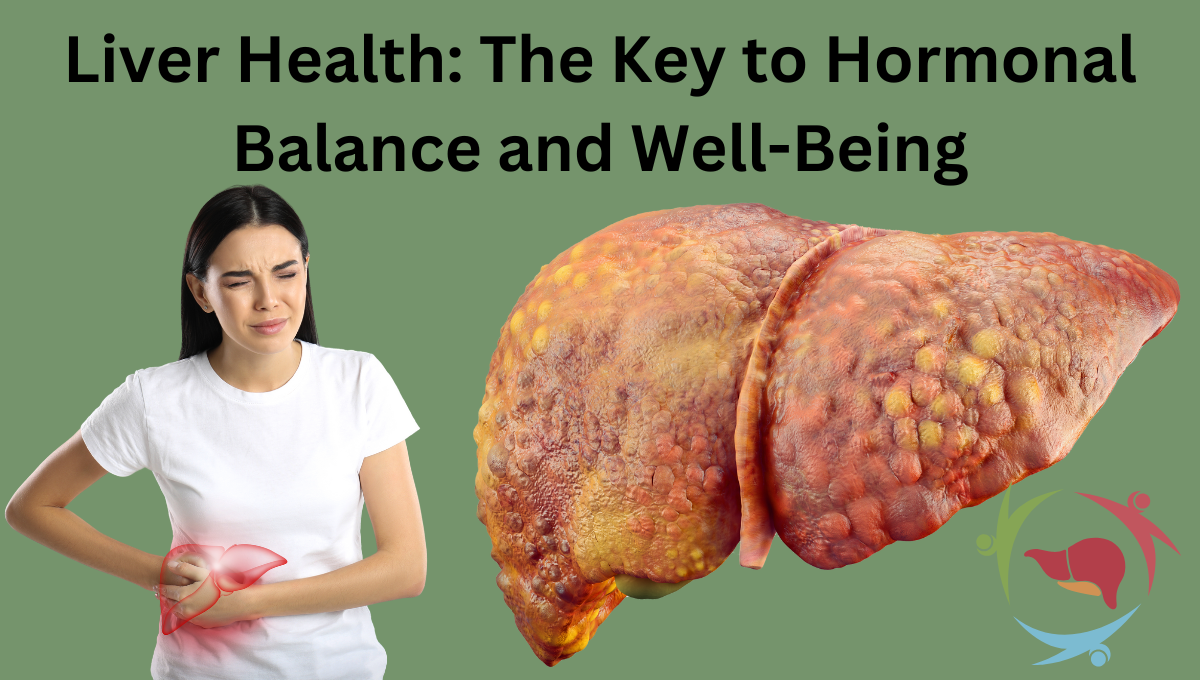Liver Health: The Key to Hormonal Balance and Well-Being
Overview
The liver, which filters pollutants, breaks down nutrients, and produces bile, is frequently acknowledged as the body’s natural detoxifier. Nonetheless, maintaining hormonal balance is one of its most important yet underestimated functions. Hormones are the body’s messengers, coordinating vital processes like stress response, mood management, metabolism, and reproduction. Hormonal imbalances brought on by liver disease might result in a variety of mental and physical difficulties.
This post will discuss the close relationship between liver health and hormone balance, how to spot imbalances, and practical measures you can take to keep both in check.
The Function of the Liver in Hormonal Control
A powerful organ, the liver is involved in several facets of hormone metabolism and control, including:
- Detoxification and Hormone Metabolism
After hormones like estrogen, testosterone, insulin, and cortisol have fulfilled their function, the liver processes and breaks them down. It makes sure that too many hormones don’t build up and interfere with normal body processes.
For instance:
Estrogen Metabolism: Excess estrogen is changed by the liver into a form that can be eliminated through the stools or urine.
Regulation of Cortisol: It aids in the metabolism of the stress hormone cortisol, avoiding protracted stress reactions.

- Bile Production for Hormones That Are Fat-Soluble
Bile, which is produced by the liver, facilitates fat digestion. Absorption of fat-soluble vitamins (A, D, E, and K), which are important for hormone production, depends on healthy fat digestion. - Control of Insulin and Blood Sugar
Through the storage and release of glucose, the liver contributes to steady blood sugar levels. Insulin, a hormone essential for energy management, is directly impacted by this. Type 2 diabetes and other disorders can result from insulin resistance, which is frequently connected to poor liver health.
How Hormonal Balance Is Affected by Poor Liver Health
The liver’s capacity to control hormones is compromised when it is overworked or injured. Hormonal imbalances can be brought on by common liver conditions such fatty liver disease, heavy alcohol use, or long-term stress.
- Dominance of Estrogen
Estrogen dominance may result from a slow liver’s inability to properly metabolize excess estrogen. Among the symptoms are:
Menstrual cycle irregularities
Extreme PMS
Gaining weight, particularly around the thighs and hips
elevated risk of diseases such as endometriosis or fibroids 2. Thyroid Issues
The transformation of inactive thyroid hormone (T4) into active thyroid hormone (T3) is aided by the liver. Fatigue, weight gain, and hair loss are hypothyroid-like symptoms that might result from slowed conversion caused by poor liver function.
- Insulin resistance and blood sugar imbalance
Insulin resistance may result from the liver’s inability to control glucose, raising the risk of metabolic diseases including polycystic ovarian syndrome (PCOS). - Elevated Cortisol Concentrations
Prolonged stress can result from impaired cortisol metabolism caused by chronic liver impairment. Weakened immunity, anxiety, and insomnia are among the symptoms.
Hormonal Imbalance Symptoms Associated with Liver Health
You could experience symptoms that are similar to those of hormone imbalances if your liver isn’t working at its best:
Exhaustion or poor vitality
Mood fluctuations or agitation
Unexpected weight gain or trouble losing weight
acne, especially along the jawline, which is a symptom of hormonal acne
Constipation or bloating are examples of digestive problems.
Period irregularities or difficulties conceiving
How to Promote Hormonal Balance and Liver Health
The liver’s remarkable ability to repair and regenerate is the good news. You can encourage hormonal balance by forming liver-friendly habits.
- Make Your Diet Liver-Friendly
Your diet has a big influence on hormone balance and liver health.

Boost Cruciferous Vegetables: Compounds in foods like kale, cauliflower, and broccoli help the metabolism of estrogen.
Consume foods high in fiber since it helps eliminate toxins and excess hormones by binding to them. Add fruits, veggies, and whole grains.
Include Healthy Fats: Fatty fish, avocados, nuts, and seeds are good sources of fats that are necessary for the manufacturing of hormones.
Limit Sugar and Refined Carbohydrates: Too much sugar can upset insulin levels and overwhelm the liver.
Drink Green Tea: Packed with antioxidants, green tea aids in liver cleansing.
- Drink plenty of water
Drinking enough water promotes healthy liver function, aids in the removal of pollutants, and improves hormone metabolism. - Work Out Frequently
Exercise helps control hormones like insulin and cortisol and enhances blood flow to the liver. Try to incorporate strength training, cardiovascular workouts, and mind-body practices like yoga. - Lower Exposure to Toxins
Reduce the amount of environmental pollutants that affect your liver.
Make use of non-toxic, natural cleaning and personal hygiene products.
Don’t drink too much.
Steer clear of processed foods that include artificial ingredients.
- Examine Supplements That Support the Liver
A healthcare professional should always be consulted before using any supplements that may improve liver function.
Milk thistle is well-known for protecting the liver.
Curcumin, which is found in turmeric, lowers inflammation and aids in liver detoxification.
Omega-3 Fatty Acids: Promotes hormone production and aids in the fight against fatty liver.
- Control Your Stress
Prolonged stress strains the liver by producing too much cortisol. Include stress-reduction strategies, including deep breathing, meditation, and outdoor activities.
When to Get Medical Assistance
Liver health can be greatly enhanced by lifestyle modifications, but in certain situations, medical intervention may be necessary. See a doctor if you or your patient suffers from chronic symptoms such as jaundice, extreme exhaustion, or inexplicable weight loss. Imaging investigations and blood tests can be used to evaluate liver health and direct treatment.
The Interaction of Hormonal Balance and Liver Health
Hormones and the liver cooperate to keep the body in balance. Making liver health a top priority benefits your entire endocrine system, not just one organ. The advantages of a healthy liver are numerous, ranging from consistent energy levels to mood balance and enhanced reproductive health.
Your general health and quality of life can significantly improve if you take tiny but regular actions to support your liver. Recall that a balanced, energetic body is built on a healthy liver. If you take good care of your liver, your hormones and overall health will appreciate it.


2 thoughts on “Liver Health: The Key to Hormonal Balance and Well-Being”